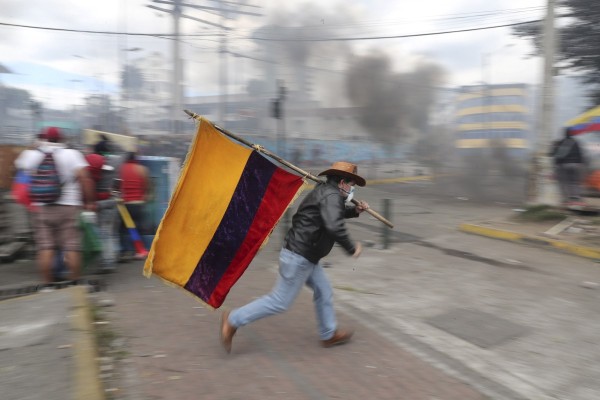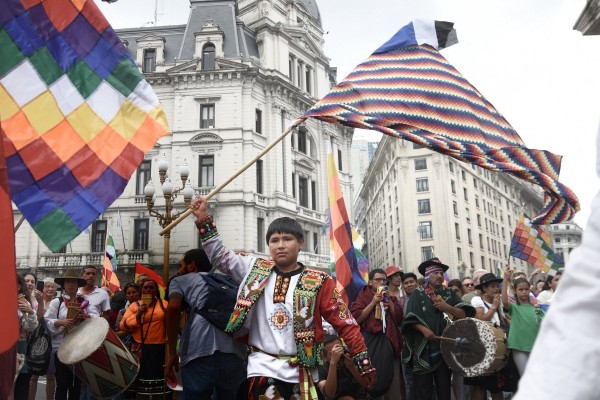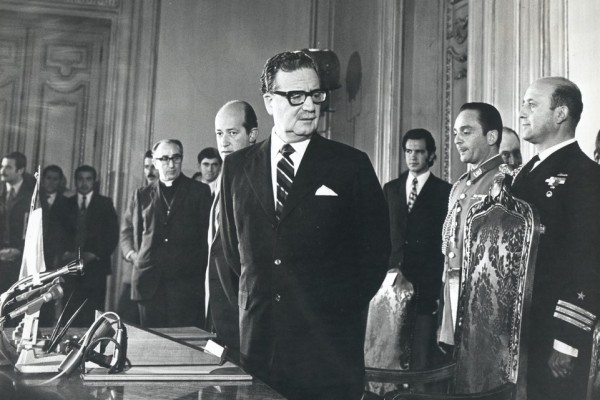Unity, struggle, and victory: The second assembly of ALBA social movements

Photo from Gabriel Proaño Flores/Flickr
One way of understanding the situation of Latin America in recent decades is the story of the emergence, strengthening and unification of popular movements. These movements initially arose as defensive mobilizations against the devastating impacts of neoliberalism. Since then, they have been working towards the collective construction of an alternative social and political bloc to bring unity and solidarity in the project for socialism in Nuestroamerica. The ALBA social movements project is the most significant force in this regard to have emerged in recent years.
Social movements at the forefront of regional integration
In the 1970s and 1980s, when Latin America became the testing lab for neoliberal policies, this brought a major reconfiguration to the social and political landscape. Organized labour was dealt a double blow, suffering systemic violence but also weakened by structural reforms. Against this background it was popular movements that took to the front lines of struggle.
These emergent popular movements often started in the form of local community or territorial resistance. Many were either apolitical or actively rejected politics; a sentiment reflected in the slogan cried on the streets of Argentina: “throw them all out, every last one”.
But around 2000-2001, after their initial protests had brought down a series of Presidents and elected officials, the movements underwent a shift in consciousness and orientation. Their objectives turned from local concerns and a rejection of politics to the question of building a collective project and taking power.
The project was first and foremost anti-neoliberal-reversing privatizations, blocking free trade agreements and restoring social welfare. But it has also become a quest to build an alternative model influenced by a variety of concerns and ideologies, including indigenism and buen vivir, Latin American Marxism, liberation theology, communitarian socialism, feminism and the environment.
This began at a national level. Many processes developed a strong current of anti-imperialism and defence of the patria (fatherland) from the forces of neoliberalism. They started to build coalitions, often working in co-ordination with more traditional movements and labour organizations, both old and new. In the cases of Ecuador and Bolivia, this included experiments with building their own political parties; Pachakutik and the MAS, respectively.
It is well known that the electoral victory of the ‘pink tide’ of left-leaning governments throughout the continent was largely an upshot of these anti-neoliberal mobilizations. But this phenomenon should be understood as only one component of an ongoing effort of movements to create spaces for exercising popular protagonism, building class-based solidarities and constructing instruments for power.
Alongside the issue of national state power has been the development of a strong current of internationalist consciousness and practice. This began two decades ago with the Congreso Latinoamericano de Organizaciones del Campo (CLOC) which brought together peasant, indigenous and afro-descendant communities, linking their struggle for land and territorial autonomy to continent-wide resistance to the neoliberal economic model.
This process saw the emergence of new forms of international alliance-building and organizational links between territorial movements. In particular, Brazil’s Landless Workers’ Movement (MST) developed a political training program through the Florestan Fernandes school (ENFF) and began to work with militants from similar movements throughout the continent.
The next major regional campaign was the defeat of the Free Trade Area of the Americas (FTAA). Based on a series of grassroots initiatives of public education courses and door-to-door talks on the dangers of the FTAA conducted by movements throughout the continent, this was the one of the most important historical defeats of U.S. domination in the region. It also demonstrated the protagonism of popular movements, and not just governments, in holding off neoliberalism and building regional integration.
The origins and aims of ALBA social movements
Following the defeat of the FTAA, myth has it that Fidel and Chavez spent the entire night strategizing over the next steps to take in advancing an alternative regional project of integration. When the sun rose, the Bolivarian Alliance for the Americas (ALBA, which translates as “The Dawn”) was born.
The basic premise of ALBA is to move from a moment of defensive resistance against neoliberal reforms towards an offensive strategy for building an alternative regional bloc. On its initial conception in 2004, ALBA was proposed as an economic and political alliance between left-leaning governments to advance a project for trade and mutual collaboration based on the principles of solidarity and social justice.
But soon after, social movements began campaigning that the project for regional integration was not a task for governments alone. If a deeper process of societal transformation was to take place, what was needed was an instrument for the construction of an alternative regional project based on the protagonism of popular movements.
In 2008 the first meetings began taking place between leaders of the PSUV and the MST on the organizational structure and composition of the articulation. In 2009 they began sending letters and delegates to countries throughout the region. Finally, in 2013, the first assembly for the social movements chapter of ALBA took place at the ENFF in Brazil.
The ALBA social movements initiative is a qualitative step forward from other global spaces of meeting and coordination between social movements such as the World Social Forum. Its aim is to go beyond the establishment of solidarities and alliances in struggle towards a constructive popular project of organizing to take power and advance socialismo nuestroamericano throughout the region.
What this means is that social movements in ALBA seek to overcome fragmentation and go beyond the focus on specific and local issues. Rather, the project is about bringing together a diversity of struggles— including anti-neoliberal, anti-racist, feminist, indigenous, environmental, community and labor movements— into a single column unified around an alternative agenda. The goal is to co-ordinate struggles into a collective regional strategy for taking power, precipitating a rupture with capitalism and taking the path towards ‘authentic emancipation based on a socialism that is afro-indigenous, feminist and nuestroamericano.’
The second assembly: Advancing the project
The purpose of the Second Assembly of ALBA movements in Colombia in December 2016 was to gather 250 delegates from participating movements together for a collective dialogue encouraging active participation in order to determine the strategy for the project to advance. A certain number of delegates were assigned from each country according to its size and geopolitical relevance. The countries with most representatives were Argentina, Brazil, Colombia, Mexico and Venezuela, but delegates were sent from all countries throughout North, Central and South America. The composition covered a diversity of gender, rural/urban origins, ethnicity and age.
The strategic discussion was organized around five different themes: 1) Popular economies; 2) Food sovereignty and territorial defence; 3) Democracy and popular power; 4) The battle for ideas; and 5) Militant internationalism. Below is presented a summary of some of the ideas and discussions that appeared in each.
- The notion of the popular economy is a matter of constructing an alternative model to capitalism. It is a question of building an economy oriented around the values of solidarity, human development, buen vivir and respect for mother nature rather than competition and profits. Building a popular economy requires the end of private ownership, to be replaced by a system of collective property able to orient the processes of production, distribution and commercialization towards the collective needs of society as a whole. This means recognizing the centrality of workers as agents in taking control over and organizing the economy. As capitalism enters into a phase of civilizational crisis, the neo-developmentalist or reformist path is no longer a viable option to resolve the problems of the people. The only solution to the current crisis is for movements to push for an alternative form of economy based on workers’ control.
- Food Sovereignty is the power of communities and peoples to exercise self-determination over their lands, water and ecological resources. This means states must recognize the sovereign power of communities to protect their territories from the predations of capital and build alternative territorial systems of common ownership and production. States must recognize local, territorially-based organizations as a mechanism for the exercise of popular protagonism in the decision-making process concerning the use of local resources in the project for communal socialism. A socialist vision for food sovereignty means building a regional system of agro-ecological knowledges of food production to meet the collective needs of society as an alternative to the capitalist mould of production and distribution.
- The principles of participatory democracy and popular protagonism are central to building socialism for *nuestroamerica*. That is to say, we are committed to working towards a process of deep societal transformation based on the increasing exercise of popular power. Our emancipatory project must take into account the plurality of oppressions— anti-colonial, anti-racist, anti-patriarchal— and be inclusive of all the different forms of struggle against them. We are all organizing together to take power. The challenge is to open up new spaces to strengthen and build popular processes, whereby struggles from below are able to take on greater agency and become agents in transformative processes. This means organizing towards concrete achievements and changes. By creating spaces for popular participation, through the experience of collective struggle, whether against racism or patriarchy, workers’, community or environmental struggles— we can prepare ourselves for power.
- To build an alternative project we must also engage in the ideological and cultural battle to win over the hearts and minds of the majority of our societies. This means educating and convincing people that they are part of the project, rather than imposing ideas. We must ensure that people do not feel excluded from our project- rather, we must find spaces for them to participate in various ways in working for the collective, in building solidarity and constructing a new society. A process of cultural transformation is needed to combat the values of individualism and consumerism that have been imposed on our societies by the dominant forces of capitalism and imperialism. We need to overcome fragmentation and instead promote a society that is able to come together through the values of solidarity and collective work. A central task here is to combat the manipulations and lies spread by privately owned media. Instead, we must struggle for the democratization of the means of communication, orienting them towards our collective purposes by prioritizing the views of people in struggle on key topics, building consciousness and defending territorial sovereignty.
- A militant internationalist vision is central to the ALBA movements project. This means sharing the experiences of our struggles across the continent and offering mutual support through solidarity and political formation. We propose the building of an international solidarity movement to join forces in the struggle against the militarization of the region and to defend our natural resources, especially water, from the predations of capital. The ALBA project is composed of a diversity of struggles: workers opposing layoffs and privatizations, peasants defending their territories and food sovereignty, students defending public education, women fighting against daily and symbolic violence on our bodies, first nations and afro-descendant communities defending land and freedom, along with many other forms of rebellion and popular organization. The goal is to unify all of these struggles into an internationalist process with a common agenda. ALBA and other integration projects allow us to build solidarity between these struggles through shared projects. The practice of organizing and educating together helps build links between local community and territorially based struggles and broader processes, like anti-imperialism, anti-capitalism and communal socialism.
Following the assembly, the next step is to continue building ALBA movements through concrete programs in which we find specific points of convergence. This could be sharing experiences and formation in workplace organizing, territorial defence, communal resource management, defending common goods, protecting agro-ecological knowledges and building these experiences into a unified project. Or, it could mean building and unifying alternative media and arts for shared understandings and a counter-hegemonic culture. Finally, it could mean organizing actions and mobilizations, or even sending militant brigades to offer solidarity at key moments. All these activities— which will be outlined in detail in the forthcoming ALBA plan of action— make us active participants in the collective project towards socialism for Nuestroamerica.
Kyla Sankey teaches in the School of Business and Management at Queen Mary University of London. She is an activist with Momentum and The World Transformed.










_600_400_90_s_c1.jpg)